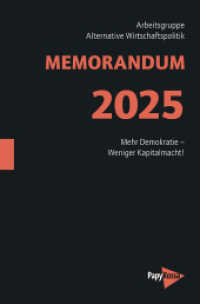- ホーム
- > 洋書
- > 英文書
- > Literary Criticism
Full Description
This book examines how non-fictional travel accounts were rewritten, reshaped, and reoriented in translation between 1750 and 1850, a period that saw a sudden surge in the genre's popularity. It explores how these translations played a vital role in the transmission and circulation of knowledge about foreign peoples, lands, and customs in the Enlightenment and Romantic periods. The collection makes an important contribution to travel writing studies by looking beyond metaphors of mobility and cultural transfer to focus specifically on what happens to travelogues in translation. Chapters range from discussing essential differences between the original and translated text to relations between authors and translators, from intra-European narratives of Grand Tour travel to scientific voyages round the world, and from established male travellers and translators to their historically less visible female counterparts. Drawing on European travel writing in English, French, German, Spanish, and Portuguese, the book charts how travelogues were selected for translation; how they were reworked to acquire new aesthetic, political, or gendered identities; and how they sometimes acquired a radically different character and content to meet the needs and expectations of an emergent international readership. The contributors address aesthetic, political, and gendered aspects of travel writing in translation, drawing productively on other disciplines and research areas that encompass aesthetics, the history of science, literary geography, and the history of the book.
Contents
Introduction Alison E. Martin and Susan Pickford Part I: Translation, Identity, and Ideology 1. The Travels and Translations of Marc-Antoine Eidous, Encyclopedic Mediator of Enlightenment Texts Clorinda Donato 2. Autopsy, Translation, and Editing in the Production of Johann Jacob Volkmann's Historisch-Kritische Nachrichten von Italien (1770-71) Jeff Morrison 3. Translating Helvetica: Travel Writing, Intertext and Image Anthony Ozturk 4. Translation, Rewriting, Adaptation: The Itinéraire descriptif de l'Espagne by Alexandre de Laborde Inmaculada Tamarit Valles Part II: Extra-European Travel Writing and Translation 5. Translating the Great Maritime Explorations: On John Reinhold Forster's Translation of Bougainville's Voyage autour du monde Vladimir Kapor 6. Translating the Pacific: Georg Forster's A Voyage round the World/Reise um die Welt (1777-1780) Carl Niekerk 7. The Travel Writer as Translator: The Case of Friedrich Ludwig Langstedt (1750-1804) Chen Tzoref-Ashkenazi Part III: Women in Translation 8. Lady Mary Wortley Montagu's Letters in France: Between Ideological Turn and Women's Writing Rachele Raus 9. A Treasure-Hunt in Europe at War, or "a passage in the history of a heart"?: The Translation of Mary Wollstonecraft's A Short Residence in Sweden into Portuguese Maria de Deus Duarte 10. Writing with "manly vigour": Translatorial Agency in Two Early-nineteenth-century English Translations of François Pouqueville's Voyage en Morée, à Constantinople et en Albanie (1805) Susan Pickford Contributors Index








